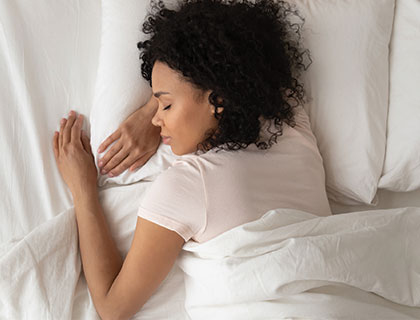
14 Ways to Get the Best Night’s Sleep
By Claire Georgiou, Reboot Naturopath, B.HSc ND
Getting a good night’s sleep is one of the most important things you can do for your overall health and well-being. Adequate sleep allows the body cells and tissues to repair and recover from the day. Sleep is important for the growth and rejuvenation of the immune, nervous, skeletal, muscular systems, and all other body systems.
If you’re on a Reboot, you may experience initial disturbances in sleep so here is a list of helpful suggestions to enhance your sleep quality and quantity. These are so important during a Reboot and beyond.
Sleep deprivation in the shorter-term will cause fatigue, lethargy, irritability, moodiness, poor cognitive function, increased appetite and many other symptoms which can make the simplest task feel overwhelming. Over the longer-term poor sleep may cause significant health problems. In modern society we average 2 hours less sleep then we did 60 years ago.
Experts know that getting less than the recommended amount of sleep can lead to serious health issues. Sleeping less than 6 hours a night can increase your risk of diabetes, high blood pressure and even premature death. A 2010 study by Britain’s University of Warwick found that getting less than 6 hours of sleep a night was linked to a dramatically increased risk of death. It has also been found to increase the risk of depression and anxiety.
Quality sleep is also very important for weight control. It has been shown in some studies that poor sleep will increase your appetite, and will affect your weight control hormones negatively. People who sleep less hours (less than 7 hours per night) have been shown to consume an extra 500 calories per day compared to people who slept for 7-9 hours. So rest up, but listen up for these 14 important tips.
1. Turn off the Tech
Avoid exposure in the evenings where possible to artificial light from electronic devices such as smart phones, iPads, computers and televisions. These will inhibit your melatonin production which is your hormone of rest. While sleeping if you use your phone as an alarm I suggest putting it on flight mode and facing it down to avoid disturbances and radiation exposure.
2. Dim the Lights
Avoid having too many lights on in the house in the evenings as this will also reduce your melatonin production. Lighting a few soft lamps that offer a low light will help with your melatonin production.
3. Rise and Shine, Literally
Exposure to natural light in the morning and avoidance of excess light at night will support your natural circadian biological clock. So keep your days light and your night’s dark.
4. Set the Mood
Your sleep area should be dark with plenty of ventilation and a haven of rest.
5. Stay on Schedule
Trying to go to bed at the same time every night will promote a regular sleep time.
6. Know the Golden Hours
Optimum sleep hours for true regenerative sleep are between 10 pm and 3 am. Remember the expression ‘every hour before midnight is worth 2 after midnight.’
7. No Booze, More Snooze
Alcohol while it may help people to fall asleep has actually been shown to disrupt normal sleep waves and creates a more restless light sleep even while the person doesn’t realise they have tossed and turned all night.
8. Keep Your Plate Light at Night
Avoid heavy evening meals as it will contribute to a restless sleep as the digestive system slows later in the day. Try to eat 3-4 hours before bed and try to make your evening meal a light to moderate meal.
9. Cut the Caffeine
Caffeine containing beverages should be avoided in the evenings such as coffee, caffeinated tea, cocoa containing drinks and desserts. Preferably avoided after 2pm.
10. Inhale, Exhale
Use essential oils such as lavender, geranium, chamomile, rose and others in oil burners, in baths, or in a spritzer mixed with water around your sleep area or add a few drops to your shower floor as you’re having a hot shower.
11. Exercise, But Not Too Late
Exercise daily particularly if you have a sedentary job or lifestyle, but try not to exercise within 2 hours of your bedtime as this will stimulate your heart rate and metabolism and will disrupt a restful sleep.
12. Rest & Relax
Calm activities for at least an hour before bed are highly recommended such as reading a book, taking a bath, writing, knitting, drawing and meditating. News reports, stressful adrenalin suspense type television episodes or movies can interfere with a restful night.
13. Less Liquids
If you have a tendency to frequent the toilet, avoid fluids 1-2 hours before bed. Remember it’s very important to stay well hydrated during the day and early evenings.
14. Sip to Soothe
If you’re going to drink before bed, consume herbal teas such as chamomile, lemon balm, passionflower, lime flowers, valerian and other restful blends.
You can learn more info about sleeping in You Snooze, You Lose (And Why That’s A Good Thing).